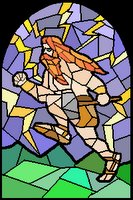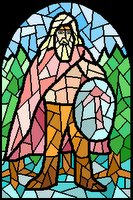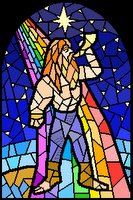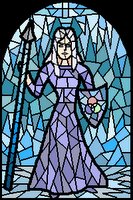If you'd like to read about the religion further, go here for a more in-depth (but dull) treatise. This makes you realize there are reasons some religions fizzle out.
If you lived in the Scandanavian countries during the time of this religion, you might have been very familiar (or even worshipped) one of these gods. JRR Tolkien and C.S. Lewis both were very familiar with Norse mythology and incorporated some of those legends into their writing.
 Odin (or, depending upon the dialect Woden or Wotan) was the Father of all the Gods and men. Odhinn is pictured either wearing a winged helm or a floppy hat, and a blue-grey cloak. He can travel to any realm within the 9 Nordic worlds. His two ravens, Huginn and Munin (Thought and Memory) fly over the world daily and return to tell him everything that has happened in Midgard. He is a God of magick, wisdom, wit, and learning. He too is a psychopomp; a chooser of those slain in battle. In later times, he was associated with war and bloodshed from the Viking perspective, although in earlier times, no such association was present. If anything, the wars fought by Odhinn exist strictly upon the Mental plane of awareness; appropriate for that of such a mentally polarized God. He is both the shaper of Wyrd and the bender of Orlog; again, a task only possible through the power of Mental thought and impress. It is he who sacrifices an eye at the well of Mimir to gain inner wisdom, and later hangs himself upon the World Tree Yggdrasil to gain the knowledge and power of the Runes. All of his actions are related to knowledge, wisdom, and the dissemination of ideas and concepts to help Mankind. Because there is duality in all logic and wisdom, he is seen as being duplicitous; this is illusory and it is through his actions that the best outcomes are conceived and derived. Just as a point of curiosity: in no other pantheon is the head Deity also the God of Thought and Logic. It's interesting to note that the Norse/Teutonic peoples also set such a great importance upon brainwork and logic. The day Wednesday (Wodensdaeg) is named for him.
Odin (or, depending upon the dialect Woden or Wotan) was the Father of all the Gods and men. Odhinn is pictured either wearing a winged helm or a floppy hat, and a blue-grey cloak. He can travel to any realm within the 9 Nordic worlds. His two ravens, Huginn and Munin (Thought and Memory) fly over the world daily and return to tell him everything that has happened in Midgard. He is a God of magick, wisdom, wit, and learning. He too is a psychopomp; a chooser of those slain in battle. In later times, he was associated with war and bloodshed from the Viking perspective, although in earlier times, no such association was present. If anything, the wars fought by Odhinn exist strictly upon the Mental plane of awareness; appropriate for that of such a mentally polarized God. He is both the shaper of Wyrd and the bender of Orlog; again, a task only possible through the power of Mental thought and impress. It is he who sacrifices an eye at the well of Mimir to gain inner wisdom, and later hangs himself upon the World Tree Yggdrasil to gain the knowledge and power of the Runes. All of his actions are related to knowledge, wisdom, and the dissemination of ideas and concepts to help Mankind. Because there is duality in all logic and wisdom, he is seen as being duplicitous; this is illusory and it is through his actions that the best outcomes are conceived and derived. Just as a point of curiosity: in no other pantheon is the head Deity also the God of Thought and Logic. It's interesting to note that the Norse/Teutonic peoples also set such a great importance upon brainwork and logic. The day Wednesday (Wodensdaeg) is named for him. Thor, or Donnar, also known as the Thunderer, was considered to be a son of Odin by some, but among many tribes Thor actually supplanted Odin as the favorite god. He is considered to be the protector of all Midgard, and he wields the mighty hammer Mjollnir. Thor is strength personified. His battle chariot is drawn by two goats, and his hammer Mjollnir causes the lightning that flashes across the sky. Of all the deities, Thor is the most "barbarian" of the lot; rugged, powerful, and lives by his own rules, although he is faithful to the rest of the Aesir. The day Thursday (Thorsdaeg) is sacred to him.
Thor, or Donnar, also known as the Thunderer, was considered to be a son of Odin by some, but among many tribes Thor actually supplanted Odin as the favorite god. He is considered to be the protector of all Midgard, and he wields the mighty hammer Mjollnir. Thor is strength personified. His battle chariot is drawn by two goats, and his hammer Mjollnir causes the lightning that flashes across the sky. Of all the deities, Thor is the most "barbarian" of the lot; rugged, powerful, and lives by his own rules, although he is faithful to the rest of the Aesir. The day Thursday (Thorsdaeg) is sacred to him. Freya is considered to be the goddess of Love and Beauty, but is also a warrior goddess and one of great wisdom and magick. She and her twin brother Freyr are of a different "race" of gods known as the Vanir. Many of the tribes venerated her higher than the Aesir, calling her "the Frowe" or "The Lady." She is known as Queen of the Valkyries, choosers of those slain in battle to bear them to Valhalla (the Norse heaven). She, therefore, is a psychopomp like Odhinn and it is said that she gets the "first pick" of the battle slain. She wears the sacred necklace Brisingamen, which she paid for by spending the night with the dwarves who wrought it from the bowels of the earth. The cat is her sacred symbol. There seems to be some confusion between herself and Fricka, Odin's wife, as they share similar functions; but Fricka seems to be strictly of the Aesir, while Freya is of the Vanic race. The day Friday (Frejyasdaeg) was named for her (some claim it was for Fricka).
Freya is considered to be the goddess of Love and Beauty, but is also a warrior goddess and one of great wisdom and magick. She and her twin brother Freyr are of a different "race" of gods known as the Vanir. Many of the tribes venerated her higher than the Aesir, calling her "the Frowe" or "The Lady." She is known as Queen of the Valkyries, choosers of those slain in battle to bear them to Valhalla (the Norse heaven). She, therefore, is a psychopomp like Odhinn and it is said that she gets the "first pick" of the battle slain. She wears the sacred necklace Brisingamen, which she paid for by spending the night with the dwarves who wrought it from the bowels of the earth. The cat is her sacred symbol. There seems to be some confusion between herself and Fricka, Odin's wife, as they share similar functions; but Fricka seems to be strictly of the Aesir, while Freya is of the Vanic race. The day Friday (Frejyasdaeg) was named for her (some claim it was for Fricka). Freyr (Fro Ingwe) is Freya's twin brother. He is the horned God of fertility, and has some similarities to the Celtic Cernunnos or Herne, although he is NOT the same being. He is known as King of the Alfs (elves). Both the Swedish and the English are said to be descendents of his. The Boar is his sacred symbol, which is both associated with war and with fertility. His golden boar, "Gullenbursti", is supposed to represent the daybreak. He is also considered to be the God of Success, and is wedded to Gerda, the Jotun, for whom he had to yield up his mighty sword. At Ragnarok, he is said to fight with the horn of an elk (much more suited to his nature rather than a sword.)
Freyr (Fro Ingwe) is Freya's twin brother. He is the horned God of fertility, and has some similarities to the Celtic Cernunnos or Herne, although he is NOT the same being. He is known as King of the Alfs (elves). Both the Swedish and the English are said to be descendents of his. The Boar is his sacred symbol, which is both associated with war and with fertility. His golden boar, "Gullenbursti", is supposed to represent the daybreak. He is also considered to be the God of Success, and is wedded to Gerda, the Jotun, for whom he had to yield up his mighty sword. At Ragnarok, he is said to fight with the horn of an elk (much more suited to his nature rather than a sword.) Tyr (or Tiw, Ziw) is the ancient god of War and the Lawgiver of the gods. He sacrifices his hand so that the evil Fenris wolf may be bound. At one time he was the leader of the Norse Pantheon, but was supplanted by Odin much later. There is nothing to indicate how this occurred; one assumes that he simply "stepped back" and let Odin assume the position of leadership. Tyr is excellent in all manners of Justice, fair play, and Right Action.
Tyr (or Tiw, Ziw) is the ancient god of War and the Lawgiver of the gods. He sacrifices his hand so that the evil Fenris wolf may be bound. At one time he was the leader of the Norse Pantheon, but was supplanted by Odin much later. There is nothing to indicate how this occurred; one assumes that he simply "stepped back" and let Odin assume the position of leadership. Tyr is excellent in all manners of Justice, fair play, and Right Action.Loki, the Trickster, challenges the structure and order of the Gods, but is necessary in bringing
 about needed change. He is also known as the god of Fire. Neither an Aesir or a Vanir, he is of the race of Ettins (Elementals) and thus possesses some daemonic qualities. He is both a helper and a foe of the Aesir; he gets them out of predicaments, but spawns the worst monsters ever seen on the face of the Earth: the Fenris Wolf and Jormurgandr, the Midgard Wyrm. His other children include the goddess Hel (Hella, Holle), and Sleipnir, Odin's 8-legged horse; these beings are at least benign, if not somewhat terrifying to behold.
about needed change. He is also known as the god of Fire. Neither an Aesir or a Vanir, he is of the race of Ettins (Elementals) and thus possesses some daemonic qualities. He is both a helper and a foe of the Aesir; he gets them out of predicaments, but spawns the worst monsters ever seen on the face of the Earth: the Fenris Wolf and Jormurgandr, the Midgard Wyrm. His other children include the goddess Hel (Hella, Holle), and Sleipnir, Odin's 8-legged horse; these beings are at least benign, if not somewhat terrifying to behold. Heimdall is the handsome gold-toothed guardian of Bifrost, the rainbow bridge leading to Asgard, the home of the Gods. The rainbow bridge seems to be a common symbol in many religious traditions other than Norse Heathenism. In the Vedic tradition, it represents the Antakaranha of humanity (connection between the body and the soul). Other traditions see it as a message from the Gods, or a Bridge between the Gods and Mankind. This would tend to indicate that the Norse/Germanic people were aware of the presence of an overshadowing Soul for each individual, as well as a group or tribal intelligence. It is Heimdall who is to sound the signal horn to the Aesir that Ragnarok, the great destruction (or transformation?) is beginning.
Heimdall is the handsome gold-toothed guardian of Bifrost, the rainbow bridge leading to Asgard, the home of the Gods. The rainbow bridge seems to be a common symbol in many religious traditions other than Norse Heathenism. In the Vedic tradition, it represents the Antakaranha of humanity (connection between the body and the soul). Other traditions see it as a message from the Gods, or a Bridge between the Gods and Mankind. This would tend to indicate that the Norse/Germanic people were aware of the presence of an overshadowing Soul for each individual, as well as a group or tribal intelligence. It is Heimdall who is to sound the signal horn to the Aesir that Ragnarok, the great destruction (or transformation?) is beginning. Skadi is the Goddess of Winter and of the Hunt. She is married to Njord, the gloomy Sea God, noted for his beautiful bare feet (which is how Skadi came to choose him for her mate.) Supposedly the bare foot is an ancient Norse symbol of fertility. The marriage wasn't too happy, though, because she really wanted Baldur for her husband. She is the goddess of Justice, Vengeance, and Righteous Anger, and is the deity who delivers the sentence upon Loki to be bound underground with a serpent dripping poison upon his face in payment for his crimes. Skadi's character is represented in two of Hans Christian Anderson's tales: "The Snow Queen" and "The Ice Princess."
Skadi is the Goddess of Winter and of the Hunt. She is married to Njord, the gloomy Sea God, noted for his beautiful bare feet (which is how Skadi came to choose him for her mate.) Supposedly the bare foot is an ancient Norse symbol of fertility. The marriage wasn't too happy, though, because she really wanted Baldur for her husband. She is the goddess of Justice, Vengeance, and Righteous Anger, and is the deity who delivers the sentence upon Loki to be bound underground with a serpent dripping poison upon his face in payment for his crimes. Skadi's character is represented in two of Hans Christian Anderson's tales: "The Snow Queen" and "The Ice Princess."Frigga (Frigg, Fricka), Odin's wife, was considered to be the Mother of all; and protectoress of children. She spins the sacred Distaff of life, and is said to know the future, although she will not speak of it. Some believe that Friday was named for her instead of Freya (see above), and there is considerable confusion as to "who does what" among the two.
The Norns (Urd, Verdande, and Skuld), are the Norse equivalent of the greek Fates. It is they who determine the orlogs (destinies) of the Gods and of Man, and who maintain the World Tree, Yggdrasil.
The goddess of the dead and the afterlife was Hel (Holle, Hulda), and was portrayed by the Vikings as being half-dead, half alive herself. The Vikings viewed her with considerable trepidation. The Dutch, Gallic, and German barbarians viewed her with some beneficence, more of a gentler form of death and transformation. She is seen by them as Mother Holle; a being of pure Nature, being helpful in times of need, but vengeful upon those who cross her or transgress natural law.
Odin's son, Baldur, the god of Love and Light, is sacrificed at Midsummer by the dart of the mistletoe, and is reborn at Jul (Yule). Supposedly his return will not occur until after the onslaught of the Ragnarok, which I see as a cleansing and enlightenment more than wanton, purposeless destruction. Baldur's blind brother Hodur was his slayer, whose hand was guided by the crafty Loki. He is married to the goddess of Joy, Nanna.
Other Gods and Goddesses include Sif (Sifa), the Harvest Goddess; Forseti, the god of Law and Justice; Bragi, the bard of the Gods and muse of Poetry; Weiland (Weyland), the Smith of the Gods, Idunna, the goddess of Youth and Beauty; Vidar and Vali, the sons of Odin who will survive Ragnarok; Magni and Modi, the sons of Thor; Eostre, the goddess of Spring and of fertility, Hoenir, the messenger of the Aesir; Sunna and Mani, the Sun and Moon; Ullr, the God of the Hunt; and Nerthus, Goddess of the Sea and of Rivers.


14 comments:
Fact is stranger than fiction.
In the mythos around the world in a great many cultures there exists this idea that the gods came down to earth and took women as their wives. And as I'm sure you are well aware, this same scenario is played out in the Bible, Genesis chapter 6. In fact, I believe all of mythology is based upon what took place in this chapter of Genesis.
If I remember my mythology correctly, in the Greek culture the offspring of these god-man unions were called Hero's, Titans, etc. In the Bible the offspring of (fallen angles) god-man unions were called the Nephilim. These beings were endowed with incredible strength and were of huge stature. Goliath, it is believed, was the result of a union between a fallen angle and a woman.
I think there is more fact than myth regarding the Pagan gods and their offspring than most would suppose.
http://www.raidersnewsupdate.com/falsegodsnew.htm
Good post.
Bryan, thanks! I keep meaning to ask you why you don't have your comments enabled in your posts?
BTW, you're correct about the similarities of this pervasive myth, though another explanation would simply be that it travelled with people who travelled from country to country. But C.S. Lewis' white witch was actually supposed to be a descendant of a race of giants born out of Adam's supposed union with a wife prior to Eve (a giantess). It's a little known legend (Catholic in origin, I believe).
my boyfriend is into norse mythology. He actually plans to get a tattoo of odin hanging from the tree. Good post. Good to see others are interested in this stuff too!
Saur, my Goddess,
I'm always fascinated with mythology, yet never 'believed' in it. I find the characters---or 'the people' to be quite intriguing. I wonder if any of it is true...My strong faith in Christianity sort of steers me back, but I can't help but read about these interesting Gods and Goddesses. You know, I love the goddess Freya, ....If I had a kid---I would probably name her that...hopefully she'll hold beauty and love...Hmmm... hopefully
Enjoy your weekend! :)
Susie, OK, yeah... this was on off-the-cuff post. I'll put something better up shortly.
Deb, Freya would be MY fave, too!
Kristie, but not many, or there'd be more responses... :D
I used to be a huge mythology fiend as a teenager. Thanks for bringing me back there. It was a good place to be, sprawled on my bedroom floor, reading (with more attention then I've ever given my homework) about Siegfried, Heracles, Isis and Osiris, etc.
My overall fascination with ancient myths even made me post about Gilgamesh. (Ok, my mum had to do with it, but if I didn't have an interest, I'd never have posted.)
Some very prominent artists and intellectual have been inspired by these myths: Wagner wrote the Tetralogia of the Nibelungen based on the Norse myth of Siegfried and the Ring of the Nibelungen.
Later, Oxford-trained South-African writer and linguist J.R.R. Tolkien was deeply inspired by the same legend when he wrote The Lord Of The Rings.
Legions of teenagers all over the western world *including formerly yours truly* used to play the biggest spin-off commercial product of Tolkien's opus: Dungeons&Dragons.
All this too say, I think your post is actually very actual. And very pertinent to understanding our current culture.
Cheers,
Beav'
Saur,
Please tell me you made all this stuff up. I did rely on the house test bank to pass humanities but I don't recall any true / false or for that matter multiple choice questions dealing with these dudes.
Now that I think about it my professor was a bald, gay New York Jew so it's possible I thought he was just makin this stuff up.
I have a lot of curiosity about how other religions (past or present) differ from my own beliefs and about their role in history. Thanks for this education about Norse mythology. I can't help but wonder how these types of polytheistic religions came into vogue, as opposed to the single God that we acknowledge.
I just can't worship a "white" Odin.....
I know a Thor that fits this decription perfectly. And thats his real name. He was named after his father and grandfather.
norse gods rock. i remember we learned about both norse and greek/roman gods back in elementary school, but i never received any more education on norse mythology after that--except for marvel comics and dugeons & dragons. ;-P
one thing new i learned from this post was that the names wednesday, thursday, and friday are actually derived from norse mythology. that's amazing!!
Great post. I find Norse mythology so fascinating. Especially the idea of Ragnarok, the battle that will end the world, foreordained down to the last detail.
All father Odin
has a huge base of seekers the world over, Today Euro youths the world over are throwing off the chains of the torah based "faiths" and rediscovering the Ancient soul of our people.
Awesome post ..
Isn't it amazing that we are raised without being taught of the God's that give the names to the days of the week?
Go figure.
Post a Comment